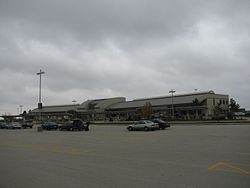Central Illinois Regional Airport
| Central Illinois Regional Airport at Bloomington-Normal | |||||||||||||||
|---|---|---|---|---|---|---|---|---|---|---|---|---|---|---|---|
 |
|||||||||||||||

Landside view of terminal
|
|||||||||||||||
| Summary | |||||||||||||||
| Airport type | Public | ||||||||||||||
| Owner | Bloomington-Normal Airport Authority | ||||||||||||||
| Serves | Bloomington / Normal, Illinois | ||||||||||||||
| Elevation AMSL | 871 ft / 265 m | ||||||||||||||
| Coordinates | 40°28′38″N 088°54′57″W / 40.47722°N 88.91583°WCoordinates: 40°28′38″N 088°54′57″W / 40.47722°N 88.91583°W | ||||||||||||||
| Website | www.CIRA.com | ||||||||||||||
| Map | |||||||||||||||
| Location of airport in Illinois/United States | |||||||||||||||
| Runways | |||||||||||||||
|
|||||||||||||||
| Statistics (2011) | |||||||||||||||
|
|||||||||||||||
|
Source: Federal Aviation Administration
|
|||||||||||||||
| Aircraft operations | 28,016 |
|---|---|
| Based aircraft | 89 |
Central Illinois Regional Airport at Bloomington-Normal (IATA: BMI, ICAO: KBMI, FAA LID: BMI) is a public airport in McLean County, Illinois, three miles east of Bloomington and southeast of Normal. Owned by the Bloomington-Normal Airport Authority, it is also known as Central Illinois Regional Airport (CIRA).
The National Plan of Integrated Airport Systems for 2011–2015 categorized it as a primary commercial service airport.Federal Aviation Administration records say the airport had 262,846 passenger boardings (enplanements) in calendar year 2008, 243,448 in 2009 and 274,677 in 2010.
The 2013 Federal sequester would have resulted in the closure of the airport's control tower, but the Federal Aviation Administration ultimately reversed its decision.
The airport dates to the spring of 1927 when farmer Herman Will opened a 70-plus-acre tract in rural Normal Township. Bordering the field to the west was the recently paved Illinois 2 (today U.S. 51/Main Street), and to the east was the Illinois Central Railroad (today Constitution Trail). Along the IC, at the northeast corner of the airport grounds, was Kerrick, a busy grain elevator station that remains a local landmark. The Bloomington Flying Club helped rally the general public and local leaders behind the economic promise of “heavier-than-air” flight. The club owned a “Jenny”-type open-cockpit biplane, and the non-profit organization evidently helped pay for both the construction of a hangar and day-to-day operations of the field. Will offered to rent the field to the city of Bloomington for $1,000 a year, but there was little enthusiasm for a municipally owned or operated airport. In 1928 the Normal field featured a six-plane hangar, filling pump, wind cone, a circle of crushed stone 100-feet in diameter (the purpose of which was to identify the field from the air) and 75 acres of “comparatively level ground.”
...
Wikipedia


